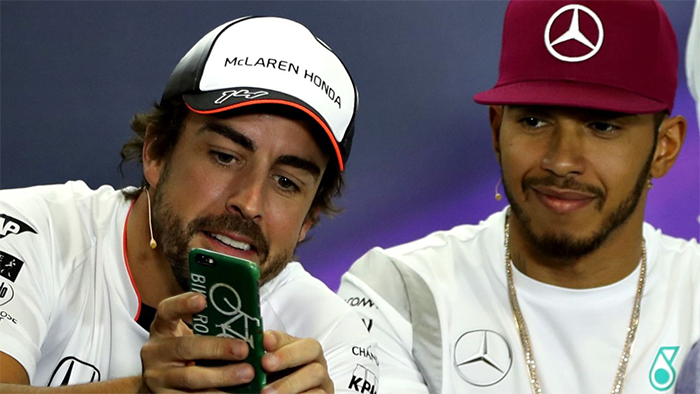
It’s officially the end of an era … Bernie Ecclestone is no longer boss of Formula One, though he has been given the honorary title of “chairman emeritus.”
Mark Thompson/Getty Images Europe/Getty Images

Bernie Ecclestone called the shots in Formula One for more than 40 years – but now there’s a new sheriff in town.
American company Liberty Media completed a $8 billion takeover of the prestigious motor racing series Monday and immediately replaced the 86-year-old.
The group, led by new chairman and CEO Chase Carey, is promising big changes but what will it mean for the sport’s global fanbase?
F1’s new managing director of commercial operations Sean Bratches, a former ESPN vice president, outlines five key changes on a visit to CNN.
F1’s star drivers are often hidden by their helmets or hunkered down in the team motorhomes on race weekends but that could be about to change in F1’s new landscape.
“You’re going to see Formula One be more proactive and a little bit edgier than it has been historically in driving celebrity and athlete personality,” explains Bratches.
“One of the things we are looking to do in the digital space is to elevate the personalities of the drivers and some of the conflicts that happen in the race.”

The sport’s ranks are filled with colorful drivers – James Hunt was a world champion on the track and a world-class party animal off it – and modern-day personalities like triple world champion Lewis Hamilton are now set to be celebrated.
“I follow Lewis on social media and he’s very active and manages it very effectively,” adds Bratches. “You need personalities – to amplify and celebrate them and elevate the controversy.”
The Grand Prix experience is another target for change.
Each race weekend runs from Thursday to Sunday with most activity focused at the track but the sport’s new chief executive, Chase Carey, wants each grand prix to become a supersize “Super Bowl” in its own right.
“My focus is the race experience itself,” explains Bratches. “Recreating the circuit experience on every level, including the paddock, in a way that re-positions the experience to a festival-like environment.

“I’ve got a robust list of ideas and plans and at this point in time I just want to signal that that experience is going to change.”
There are 20 races on the 2017 F1 calendar from the season-opener in Australia on March 26 to the Abu Dhabi finale eight months later.
Bratches will be traveling to all the races and promises the sport’s new owners will be implementing changes “as soon as possible.”
He adds: “Australia is probably a little bit early as it’s the first circuit. We’re going to select a circuit as we get into the schedule and start doing reveals.”
The stops on F1’s world tour will also come under scrutiny.
“I’m going to spend a lot of time looking at the circuits,” says Bratches, who has relocated from New York to London.
“My focus is going to be re-establishing Formula One in core F1 markets such as Europe, and then looking to growth markets that we collectively believe have the opportunity to expand the reach of the sport like Latin America, the US and Asia.”
Ecclestone was a master promoter of the sport. He expanded F1 beyond its European heartlands and in the last decade alone he took the sport to Abu Dhabi, Azerbaijan, India, Russia, Singapore and South Korea with mixed success.
A second race in the US around the streets of New Jersey had been on the cards in 2014 but was then dropped from the calendar with Ecclestone telling CNN: “they haven’t got any money.”
Will F1’s new American owners be actively looking at bringing another F1 race to home soil?
“Actively!” says Bratches. “Having the theater of Formula One in the backdrop of some of the iconic US cities could be very attractive on multiple levels.
“It’s high on the list of markets where we’d like to see at minimum one more circuit. The fan base is ripe there.”
When Ecclestone ruled F1 there was no doubt who was in charge.
As recently as 2016, Ecclestone told a Russian journalist: “I don’t think there’s any place for democracy.”
Grand prix winner Johnny Herbert recalls first rubbing shoulders with Ecclestone in his debut F1 season in 1989.
“Sir Stirling Moss had it spot when he said F1 needs a dictator,” Herbert tells CNN. “That’s Bernie to a ‘T.’
But new owners Liberty Media plan to bring about regime change.
“I want to create a little bit more of a democratic process than has been incumbent in Formula One historically,” explains Bratches. “From teams to sponsors, rights holders and promoters.”
F1’s commercial terms – including a split of its prize money and TV revenues – are governed by the Concorde Agreement which was signed by Ecclestone, the sport’s governing body the FIA and the teams.
The current deal extends until 2020 but Bratches says that doesn’t have to be an obstacle to change.
“We’re going to respect that agreement,” says F1’s new commercial chief.
“But that doesn’t necessarily mean that we can’t approach our partners … to the extent that there is consensus around a change we may want to make or something that benefits all parties. That is something that we could explore.
“We need an environment that teams are interested in joining. Our goal is to make it as attractive as possible for incumbent teams to prosper and interested parties to come to our sport.”
F1 fans should also stand by for an increased digital offering – something they’ve been asking for – via social media of course – for some time.
While octogenarian Ecclestone once claimed he was “not interested in tweeting, Facebook or whatever this nonsense is” the sport’s new owners are preparing to push the digital boundaries.
“I will be putting a lot of energy behind transforming and re-imagining the digital aspects of Formula One,” promises Bratches. “It’s an extraordinary opportunity to engage fans in new ways. Putting our shoulder behind digital is a huge priority.”
While Bratches did not go into the specifics of what fans can expect in 2017 and beyond he did rule out moving F1 from television to a digital-only subscription platform.
“Moving in totality away from our television partners would be deleterious to the sport from a fan and economic standpoint,” he explains.
“I think there are opportunities to create experiences in the digital world that compliment television and the experiences fans get through that particular medium.
“Liberty is going to make a significant investment in growing the sport and we’re going to do so with an understanding of the extraordinary heritage of the sport, the passion, the bravery, the technology that goes into it but we’ll also be looking forward.
“We are the custodians of the new brand and we will be respectful of the past but we’re going to be very aggressive about how we take it into the future.
“It’s an awe-inspiring challenge for all of us – and a very good thing for the fans.”
Niall Ferguson: What’s Trump’s plan with Iran, and beyond?
Is there a deeper strategy underlying President Trump’s actions? Dan is joined by historian, Free Press columnist, CBS contributor, and Senior Fellow at Hoover Institution…
Thought Leader: Niall Ferguson
Loretta Mester: The Future of Federal Reserve Independence
Loretta Mester, Fmr. Cleveland Fed President, joins ‘Closing Bell Overtime’ with reaction to Pres. Trump’s announcement of Kevin Warsh as his nominee for the next…
Thought Leader: Loretta Mester
Dr. Sanjay Gupta: Why You Should Brush Your Teeth Before Breakfast
We all know we should brush and floss our teeth. But the reason goes beyond a sparkling smile and keeping bad breath at bay. The mouth is a critical and often overlooked organ when it comes to improving overall health. Dr. Sanjay Gupta sits down…
Thought Leader: Sanjay Gupta


